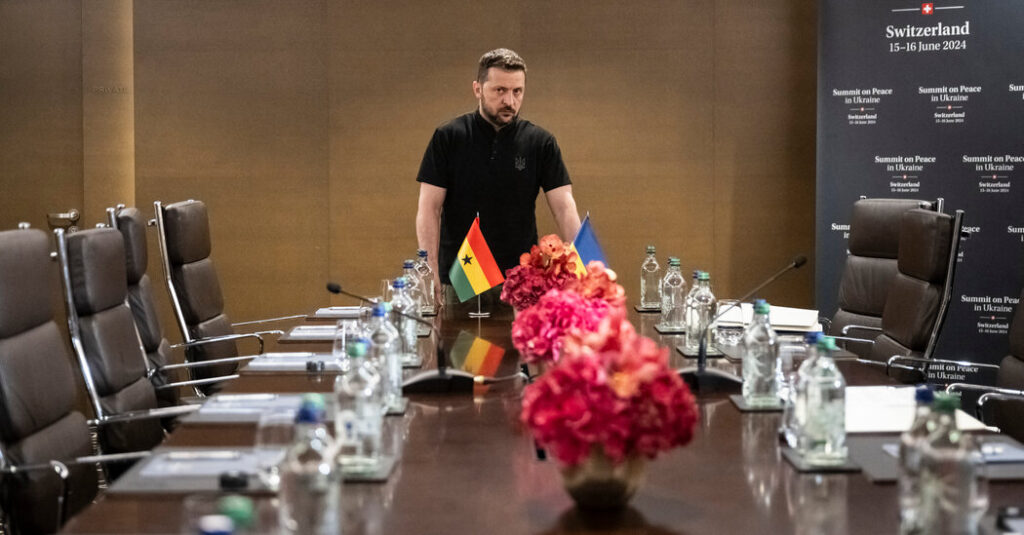At a two-day summit in Switzerland on Sunday, dozens of countries joined Ukraine in calling for “dialogue between the parties” to end the war with Russia. But Ukrainian President Volodymyr Zelensky said he remained firmly opposed to any negotiations that might require Ukraine to cede territory.
The weekend summit drew dignitaries from some 90 countries to the Swiss Alpine resort; Russia was not invited, so China and Brazil declined to attend.
At the end of the meeting, most delegations signed a statement of common principles, such as promoting prisoner exchanges and nuclear security.
They also said “further engagement between representatives of the parties” was necessary to proceed, a vague wording that underscored the lack of consensus on the biggest outstanding question at the conference: When and how should Ukraine and Russia pursue peace talks?
With an all-out war between the two countries entering its third year and no clear path to military victory for either side, some world leaders have called on the warring sides to negotiate and compromise. India, Saudi Arabia, South Africa, Turkey and other countries reiterated the message at the summit.
But Zelensky has long believed that lasting peace in Ukraine can only be achieved if Russia fully withdraws its troops. He told reporters on Sunday that once the international community develops a peace plan based on the summit’s conclusions, “then this approved plan will be passed on to representatives of the Russian Federation.”
“Then,” he added, “we will see if they are ready to end the war.”
Asked about the prospect of negotiations, he said, “If Russia leaves our legal territory, it can start negotiations with us tomorrow without waiting for anything.”
Ukraine has invited Switzerland to host the summit and is seeking to attract as many world leaders as possible to the event, which is important in building global momentum for Zelensky’s vision to end the conflict, which also includes reparations and justice. offense.
“The Russian Federation’s ongoing war against Ukraine continues to cause massive human suffering and destruction, and creates risks and crises with global consequences,” the meeting said in a joint statement.
But India, Mexico, Saudi Arabia, South Africa and the United Arab Emirates are among the few countries that have refused to sign. Senior Indian diplomat Pawan Kapoor said India did not support the statement because “only options acceptable to both sides can lead to lasting peace.”
South Africa criticized the summit’s inclusion of Israel and called for greater efforts to promote negotiations between Russia and Ukraine. (South Africa accused Israel of genocide at the International Court of Justice, a move Israel called “despicable.”)
“Our actions should not rule out the possibility of Russia and Ukraine returning to the negotiating table,” South Africa’s presidential national security adviser Sydney Mufamadi said in a statement.
Ukraine’s Western allies have made little mention of possible peace talks with Russia. Ursula von der Leyen, president of the EU’s executive body, said Russia could only be “part of the effort to push the path to peace towards its destination” if it expressed its commitment to UN principles such as territorial integrity.
“A key question remains: How and when will Russia become involved in this process?” Swiss President Viola Amherd said. “The discussions over the past two days have shown that there are different views.”
Swiss officials said the way forward could be to engage with Russia on specific priorities discussed at the summit, including ensuring the safety of Black Sea shipping and releasing prisoners of war.
Ukraine’s main ally, the United States, was represented at the summit by Vice President Kamala Harris, who left on Saturday night after the first day. President Joe Biden’s national security adviser Jake Sullivan told delegates on Sunday that the summit laid the groundwork for future negotiations, but gave no details on when or how.
He said such talks would be based on countries’ recognition of “the concepts of sovereignty and territorial integrity” outlined in the United Nations Charter.
“This creates a platform for Ukraine to continue negotiations from a position of confidence to ensure its sovereignty and territorial integrity,” Mr Sullivan said.
To end the war, diplomatic support could increase Ukraine’s influence in eventual peace negotiations. But developments on the battlefield will certainly influence any solution.
Russia’s offensive that began in the winter has shown signs of gradually weakening. It moved the frontline by as much as about 15 miles to the west of the town of Avdiivka in Ukraine’s eastern Donbass region.
On the Ukrainian side, U.S. ammunition and weapons are helping to turn the tide in Kiev’s favor. Aid has begun arriving on the battlefield after months of delays in Congress approving it. Ukraine is expected to receive its first F-16 fighter jets this month or next, but the prospects for these fighters will only gradually improve as pilots master the skills to fight the aircraft.
Zelensky said he would continue to push forward diplomatic efforts in preparation for a second summit to present a peace plan to Russia. He said Ukraine was already in talks with countries interested in hosting such a meeting.
But Russia has shown no willingness to engage in Zelensky’s diplomatic orbit. Kremlin spokesman Dmitri S. Peskov dismissed the summit in a television interview broadcast Sunday, saying “they will not talk about peace.”
Report contributors: John Elligon Departure from Johannesburg; Mujib Mashal Departing from New Delhi; and Andrew E. Kramer and Natalia Novosolova From Kiev, Ukraine.

